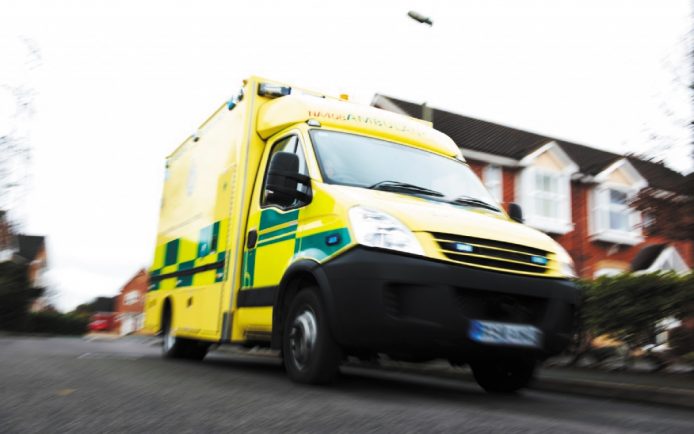THE LAST decade has been “incredibly special” for West Midlands Ambulance Service says its outgoing chairman.
Sir Graham Meldrum will step down at the end of March after 14 years as the trust’s chairman during which he has seen it become the only ambulance service rated as outstanding by the Care Quality Commission and one of only two given the top rating by NHS Improvement.
During his time Sir Graham has seen the trust consistently exceed national performance standings, have a paramedic on every vehicle and have no frontline vehicle older than five years.
Sir Graham said: “The last decade has been an incredibly special one – seeing the trust develop and achieve things that might not have seemed possible ten years ago.
“While the decisions taken by the board and senior leadership have undoubtedly shaped the way the service has developed, it could not have been achieved without the most important part of the organisation – the staff.
“The people within this service are ever so special. That is true throughout the service, whether on the road, in our control rooms, patient transport, in corporate functions, fleet, vehicle preparation, supplies, everyone. Wherever you go, you meet very, very special people and all of them have one thing in common, their dedication to providing the best service possible to patients.
“Everything we do is all about the patient, ensuring we provide the best service available. The fact that external inspectors see that and have rated us as outstanding on two occasions is extremely pleasing and something the staff should be very proud of.
“What makes it even more special is the fact that we are not the best funded ambulances service, in fact we are the worst funded. To a large extent, the reason we have been so successful is the roll out of the ‘Make Ready’ system where we have 15 large hubs instead of over 80 small ambulance stations.
“It has allowed us to become far more efficient which has allowed us to invest far more than we would have been able to in frontline staff and vehicles, which is ultimately what is needed to provide a high quality service.
“Whilst we are undoubtedly successful, the service will not stand still and will continue to develop long after I have left. Over the next decade I see West Midlands Ambulance Service becoming a mobile treatment service.
“What used to be large items of equipment only found in hospitals are now miniaturised and could be deployed on ambulances such as ultrasounds, we can already do blood tests and eventually we could see mobile scans and x-rays.
“Allied to this, we will develop the skills that our staff have. By combining the skills and new treatments, we will see far fewer taken to hospital. There is no doubt in my mind that the ambulance service will continue to be a key part of the national health service.”
Sir Graham will be replaced by Professor Ian Cumming when he retires from his current role of chief executive of Health Education England – the education and training organisation for the NHS.
His career in the NHS spans 38 years – originally training as a research scientist, before spending 25 years as an NHS Chief Executive. He has worked in hospitals, commissioning services and as chief executive of the NHS in the West Midlands in 2009.
Professor Cumming said: “I believe the ambulance service is the jewel in the crown of the NHS.”
“I have had a personal interest in pre-hospital care for many years. The ambulance service meets people at a time when they are arguably at their most vulnerable.
“We are there when people need us with staff who are highly skilled and trained professionals. Not only are we handling physical injuries and illness, our staff are at the forefront of dealing with emergency care for people with mental health and social care issues.
“Because of that, the ambulance service has to be a fundamental part of the caring and compassionate NHS that we seek to provide for all citizens of this country.
“WMAS already has a real focus on keeping the trust at forefront of developing patient care and I am looking forward to helping them continue that journey. There aren’t many ambulance services that come close to what WMAS achieves, but we need to be looking to the future and staying ahead of the curve.
“As we move into the 2020s, we need to be innovating and looking to harness the power of new technology such as the true integration of 111 and 999 services but also looking at better links between emergency and non-emergency ambulance services.
“We also need to look at the ‘internet of things’ so that we can automatically connect people’s houses through to our systems so that we know when somebody may be in difficulty even if no-one is able to contact us themselves.
“There is no doubt that the next decade will be one of real change for the ambulance service and the NHS with the growth of technology and integration.
“I think we will see ambulance services move into the delivery of mobile health care in people’s homes whether a blue light response or more routine elective type care.
“We already have highly skilled staff such as our paramedics along with the vehicles and infrastructure to be able to respond to the needs of the population.”











